The Buddy Holly Story Blu-ray Movie
HomeThe Buddy Holly Story Blu-ray Movie 
Limited Edition to 3000 - SOLD OUTTwilight Time | 1978 | 114 min | Rated PG | Aug 12, 2014
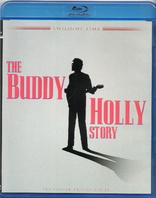
Movie rating
7.5 | / 10 |
Blu-ray rating
| Users | 0.0 | |
| Reviewer | 4.0 | |
| Overall | 4.0 |
Overview
The Buddy Holly Story (1978)
The story of one of rock ‘n’ roll’s first legends, Buddy Holly. Holly’s career is followed from his high school days in Lubbock, Texas and his rise above the disaproval of his music by the locals and his conservative family, through his meteoric success with his band the Crickets, to his untimely death in a plane crash when he was just twenty-two years old.
Starring: Gary Busey, Don Stroud, Charles Martin Smith, Conrad Janis, William JordanDirector: Steve Rash
| Music | Uncertain |
| Biography | Uncertain |
| Drama | Uncertain |
Specifications
Video
Video codec: MPEG-4 AVC
Video resolution: 1080p
Aspect ratio: 1.78:1
Original aspect ratio: 1.85:1
Audio
English: DTS-HD Master Audio 5.1 (48kHz, 24-bit)
Music: DTS-HD Master Audio 5.1
Subtitles
English SDH
Discs
50GB Blu-ray Disc
Single disc (1 BD)
Playback
Region free
Review
Rating summary
| Movie | 3.5 | |
| Video | 4.5 | |
| Audio | 4.5 | |
| Extras | 2.0 | |
| Overall | 4.0 |
The Buddy Holly Story Blu-ray Movie Review
Killing them energetically with his songs.
Reviewed by Jeffrey Kauffman August 23, 2014Don McLean famously immortalized February 3, 1959 as “the day the music died” (whether or not McLean himself was immortalized in “Killing Me Softly With His Song” is still up for debate). American Pie reminded a younger generation of an event that had receded into the memories of many, a horrific plane crash that killed two of the guiding lights of the nascent rock ‘n’ roll era, including Buddy Holly and Richie Valens. Valens’ story was told in La Bamba, due in just a couple of weeks from Twilight Time. That film had the involvement and approval of several people who were either related to or who knew Valens, and while it, like most biographical movies, took some liberties with its subject, it’s at least relatively faithful to the historical record. Nine years before La Bamba premiered in 1987, The Buddy Holly Story didn’t have the imprimatur of relatives or co-workers going for it, and indeed those who knew of Holly’s real story were somewhat shocked at the changes that were made in several key characters who were part of Holly’s life. These changes included the complete omission of one member of Holly’s iconic backup band The Crickets, as well as name changes for the others, not to mention other characters who seemed to be amalgamations of several people. At least part of this was due to intense behind the scenes legal wranglings that involved rights issues, since The Crickets had evidently sold their stories to another filmmaker and therefore could neither contribute to this film nor be portrayed with their actual names. These perhaps unavoidable choices start The Buddy Holly Story out on a rather precarious foot, but if understandably miffed fans can get past them, the film has an ebullience that seems to echo the energy that informed so much of the early rock ‘n’ roll era.
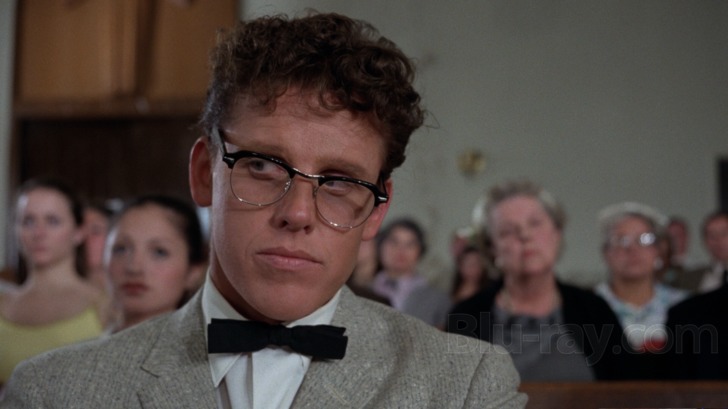
Buddy Holly (Gary Busey) is already an up and comer at the film’s opening, working with The Crickets on a local Lubbock, Texas radio show. His music is almost quaint by today’s standards, a mixture of rockabilly and rhythm and blues, but to an older generation raised on the more mellifluous sounds of the big bands and the then very popular “easy listening” format, it seems like, in the words of the local pastor, “jungle music”. In fact Buddy is upbraided uncomfortably in church by the pastor, a situation that hits close to home when it’s soon disclosed that Buddy’s parents are expecting him to go to seminary and drop his music making activities.
Buddy’s nascent romance with Cindy Lou (Amy Johnston) is interrupted one night when his bandmates tell him the owner of the radio station where they’ve been playing wants to see him. Buddy visits Riley Randolph (Bill Jordan), who gives the kid a bunch of recent rock inflected records he has which he doesn’t dare play for the staid ears of the Lubbock population. More importantly, Riley discloses that a record company executive in Nashville had heard the controversial broadcast and wants Buddy to come there to record. This seems to be the big break that Buddy and his bandmates have been wanting, and they head off to Tennessee (there’s a funny moment in their car ride where they attempt to escape the omnipresent “easy listening” fodder that was then so popular on the radio and records). But the Nashville session turns out to be a disaster, and Buddy and the group return to Lubbock completely crestfallen.
Though Riley is uptight about having Buddy and the boys play rock ‘n’ roll on the radio, the kind hearted radio impresario continues to help the band, this time sending some of the boys’ music to another label in New York City. This time lightning strikes, and Coral Records executive Ross Turner (Conrad Janis) gives Buddy the artistic freedom the Nashville producer wouldn’t. In the meantime, Turner has already released the pre-existing version of “That’ll Be the Day”, and the record becomes a sensation. This section of the film may be particularly disheartening to Holly fans, for it completely avoids the fascinating story of Holly’s “non compete” clause that he signed during his brief stint in Nashville, something that ended up with The Crickets being credited with the single release so that Holly could be shielded from potential legal action. The hilarious part of all of this is that every deal that Holly signed, including the one that included the “non compete”, was part of one huge recording conglomerate (Decca), but various subsidiaries were warring with each other to protect their own interests. (Decca never took any legal action against Holly or The Crickets, realizing they had more to gain by simply keeping their mouths shut.)
The film continues to document the group’s whirlwind, including a performance at The Apollo in Harlem where a promoter had booked them thinking the band was African American. An overly dramatic subplot is introduced that ultimately leads to the breakup of Buddy and The Crickets, forcing Buddy to go it alone on a tour. Meanwhile Buddy has romanced a beautiful young Puerto Rican girl named Maria Elena (Maria Richwine), and the two have married despite some initial misgivings by her family. Things proceed to the simultaneously triumphant and tragic conclusion, where Buddy, just beginning to feel his oats as a rock ‘n’ roll superstar, decides to board a plane on a frigid February night to get to his next gig.
While the general outlines of Holly’s life are dealt with in a reasonable enough fashion here, there are woefully too many detours from the actual record (no pun intended) to sit right with anyone who knows the real Holly story. It’s a shame, really, not only because the true tale is so remarkable, but also because the performances in his film are so winning. Busey does a remarkable job recreating Holly’s almost manic energy on stage (Busey evidently lost over 30 pounds to play the lithe and lean Holly). While there’s a large and colorful cast supporting Busey here, this is in essence Busey’s film from virtually the first scene to the last, and he is a really commanding presence throughout. The film is also notable for the fact that the actors actually play their own instruments and sing themselves (though evidently some overdubbing was done in post, especially with regard to some of the guitar). That gives the live performance sequences an almost startlingly visceral quality. (Joe Renzetti received the Academy Award for his music adaptation.)
This wasn’t a big, opulent Hollywood production by any stretch, but that perhaps fits in better with the scrappy ethos of the first rock ‘n’ roll artists. This could have been a grand slam biographical achievement had it hewed a bit more closely to the facts. As it is, it’s an exciting piece of Hollywoodized fiction that hints at the vibrancy of this era without really delving into some of the convoluted stories that contributed to that vibrancy. Holly’s story is told more accurately in both the musical Holly as well as the Paul McCartney produced documentary The Real Buddy Holly Story (which ironically appeared the same year as La Bamba). But for those who don’t mind a rather questionable mix of fact and fiction, The Buddy Holly Story offers a lot of fantastic music and a sensational lead performance from Gary Busey.
The Buddy Holly Story Blu-ray Movie, Video Quality 
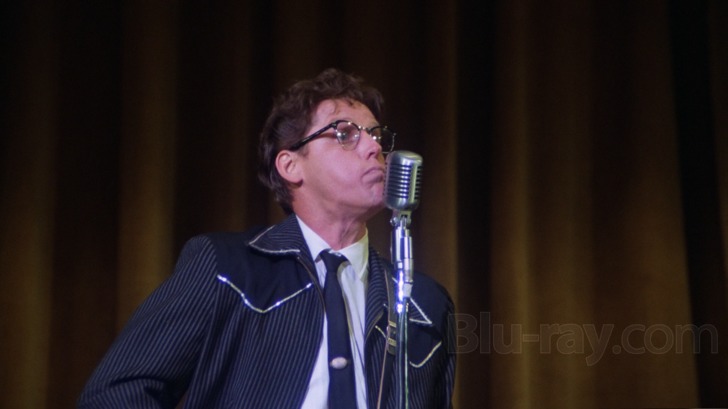
The Buddy Holly Story is presented on Blu-ray with an AVC encoded 1080p transfer in 1.78:1. This release is reportedly the result of a new restoration effort by Grover Crisp and Sony, and the results are largely impeccable. While the film was obviously shot on a veritable shoestring, there's admirable clarity throughout this presentation, with nicely saturated and accurate looking colors. The film is rather soft looking quite a bit of the time by contemporary standards, but looks organic and natural. Contrast is also strong and stable and even some of the dimly lit interior sequences have at least adequate (and usually much more than that) shadow detail. There is some stock footage used here that is almost shockingly rough looking at times, but it's typically utilized only for fleeting establishing shots. My one niggling qualm here (and it's fairly niggling) is inconsistent grain resolution. There are a couple of times when the grain field becomes kind of splotchy and yellow looking. This is a minor distraction in what is otherwise another great looking master from Crisp and his team.
The Buddy Holly Story Blu-ray Movie, Audio Quality 
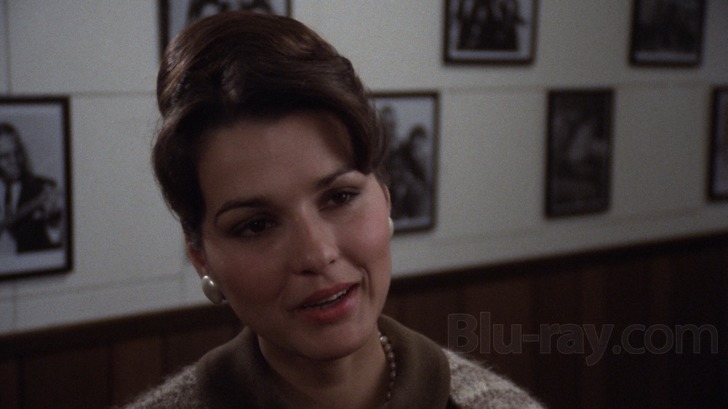
The Buddy Holly Story's lossless DTS-HD Master Audio 5.1 really erupts during the music sequences, with nicely full sounding low and midranges. The guitars sound really vivid and bright without seeming shrill, and the singing is always well prioritized. The music is the most obvious use of the surround channels, but dialogue is at least occasionally directional and environmental ambience is also placed discretely. Dialogue is always clear. There are absolutely no problems to report on this track.
The Buddy Holly Story Blu-ray Movie, Special Features and Extras 
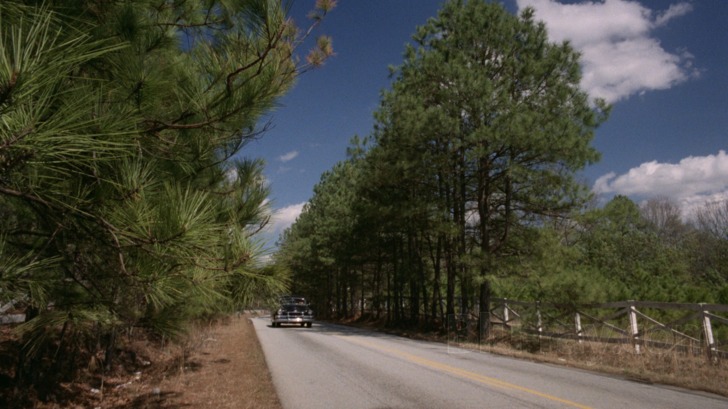
- Theatrical Trailer (1080p; 2:37)
- Audio Commentary with Director Steve Rash and Actor Gary Busey is really nicely informative while being conversational. The two talk about things like an early use of Steadicam and various locations that were utilized. Busey also discusses what rock 'n' roll meant to him growing up.
- Isolated Score Track is presented in DTS-HD Master Audio 5.1
The Buddy Holly Story Blu-ray Movie, Overall Score and Recommendation 
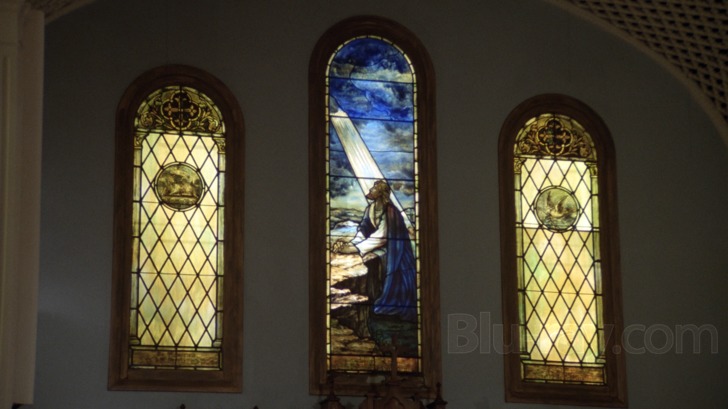
It's easy to fault The Buddy Holly Story for the way(s) it plays fast and loose with the actual facts of Holly's tragically short life, but that issue is at least partially overcome by the sheer intensity of Busey's performance. Busey, who has become almost infamous as the sort of semi-crazy elder you tend to steer clear of in your neighborhood, shows just a hint of that dangerous side here, making his portrayal of Holly surprisingly nuanced and shaded. The music is also a nonstop joy, all the more remarkable in that much (if not all) of it is actually being performed by the actors. Technical merits here are very strong, and The Buddy Holly Story comes Recommended.
Similar titles
Similar titles you might also like

Amy
2015

Linda Ronstadt: The Sound of My Voice
2019

Whitney
2018

Miles Ahead
2015

Judy
2019

Marley
with Bonus Disc
2012

Mystify: Michael Hutchence
2019

Back to Black
2024

Get on Up
2014

Elvis
1979

I Saw the Light
2015

A Star Is Born
2018

La Bamba
1987

El Cantante
2006

Vox Lux
2018

Whitney Houston: I Wanna Dance with Somebody
2022

Sinatra: All or Nothing at All
2015

Leonard Cohen: I'm Your Man
2005

The Runaways
2010

Great Balls of Fire!
1989
